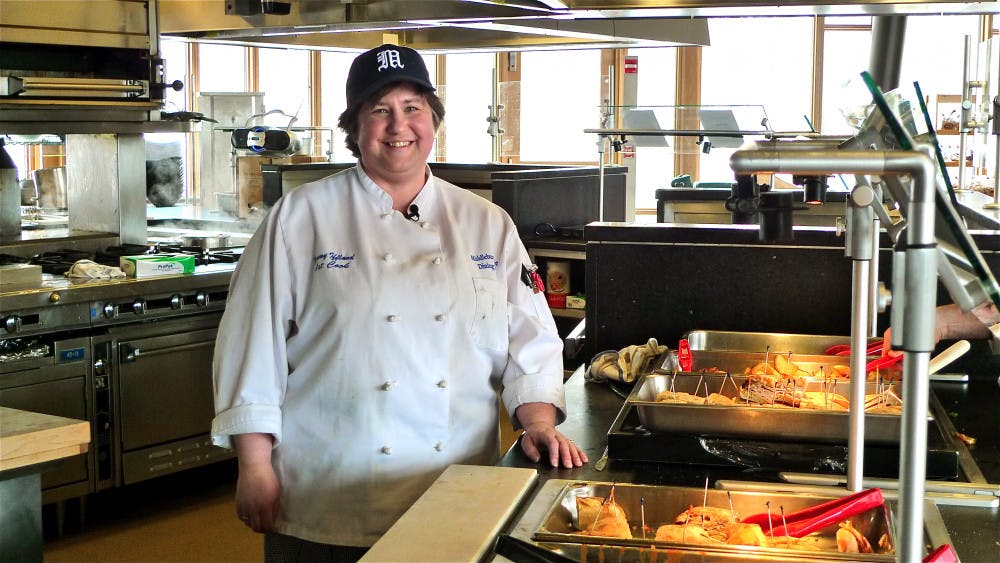Tammy Iffland, first cook in Atwater Dining Hall, is perhaps one of the happiest people I’ve ever met.
“My job is fun,” she told me. “We love making you guys happy.”
Iffland’s day starts around 7 a.m., but Atwater opens even earlier, with dry goods arriving on trucks from Burlington Food Service starting around 5 a.m. All the food comes in through the loading dock behind Atwater, where the trucks back in through giant garage doors. The dock is heated “so we’re not freezing to death while we’re taking all the freight off the trucks,” Iffland said.
“There’s a lot that goes on, you know, that you guys don’t see,” she said. “A day in my life … it’s getting here, make sure we have enough food, make sure the food that I’m counting on was ordered and is coming on the truck …”
Sometimes the trucks can be unpredictable, and Iffland has to wait until 8 or 9 a.m. for some of the produce she needs to cook that day.
On a typical day in Atwater, there are anywhere from five to seven staff members who Iffland “look[s] after,” and who look to her for answers. They all stock the store rooms shelves and three walk-in refrigerators in the basement of Atwater as food comes in off the trucks. Then, Iffland tells the chefs to “gather what we need for the day,” and all the produce and ingredients are brought upstairs in their elevator.
Chopping vegetables, fabricating meat, assembling sandwiches and like tasks happens in the back prep-kitchen upstairs. The prep-kitchen can get pretty busy with everyone working around one another. All the food is then cooked in the open kitchens behind the two lunch-lines. Chefs have to be careful to stay professional in the open setting of these kitchens.
“We’re not ghosts back here,” Iffland said. “You can hear what we’re saying, just as well as we can hear what you’re saying!” But she has never had problems with the professionalism of her staff.
In the back prep kitchen especially, “it’s very friendly,” Iffland said. She thinks her team works very well together, which is important.
“It’s like any relationship, doesn’t matter if it’s personal or professional,” she said, “you’ve got to really work at it” to collaborate. The chefs in Atwater spend eight to ten hours a day working next to one another.
“Sometimes you see these guys more than you see your own family. I enjoy working with each and every one of these guys,” said Iffland, and it is clear from seeing her camaraderie with the chefs that they enjoy working with her too.
Iffland first realized that she wanted to cook at age 14 when she was working for a catering company, washing dishes and watching the grand production around her.
“I loved the tedious stuff, you know like the little pastries and little tea sandwiches, and the beautiful spreads that they put out. I fell in love with it … So I’ve spent the rest of my career learning all that stuff.”
Iffland got a degree as a pastry chef and later went to culinary school in New Hampshire, where she met her husband Rick Iffland, who is a cook in Ross Dining Hall. For four years, before coming to Atwater, Iffland served as the private house cook for President Liebowitz’s family, where her kitchen had to separate utensils and dishware for meat and dairy to follow the kosher dietary laws. The Liebowitz family meals were not especially fancy, according to Iffland; “they eat like you and me.” The family loved salmon cakes, empanadas, whole-wheat dough pizza and salads.
Iffland also helped to run Otter Creek Bakery in town for eight years, and has run bakeries in multi-million dollar operations in Phoenix, AZ, which gave her plenty of experience for the managerial side of being a first cook. Alongside Darren Zeno, the other first cook in Atwater, she has to know accounting, plan menus, order food, implement recipes and calculate how much food to cook.
Atwater serves between 800 and 900 students a day, which has posed a challenge for finances since the economic downfall. Iffland works hard to avoid over-production and plans menus to “stretch that dollar,” “make things sustainable” and “use things that are grown here, things that are made here,” as opposed to importing produce. In the spring and summer especially, Atwater uses large amounts of produce from the organic garden.
The 800 to 900 students also pose challenges for seating; there are only 265 seats in Atwater. “We try to turn those seats as quickly as we can,” Iffland said, hence the two lunch lines to speed up the process.
“I actually feel bad when we run out of seating,” Iffland said. On Mondays and Wednesdays, Atwater’s busiest days, the dining hall often fills at the 11 a.m. and 12:15 p.m. rushes, and sometimes again when the next class gets out at 1:30. Students sometimes go back to sit at the chefs’ break table behind the vegetarian line, which is ok according to Iffland.
“We want you to enjoy the food, and we’re proud of what we do.”
In the near future, Iffland says, dining halls are planning to coordinate their menus to make food costs more efficient. This means that “you’re going to see probably the same menus in every dining hall,” and Iffland will no longer decide the dishes cooked in Atwater.
“I think that’s fine,” she said. “We just want to make sure we can make food for everyone, and that everyone’s satisfied with their experience here.”
The food matters a great deal, of course, but Iffland believes the experience of being a student at Middlebury “is just as important.”
Atwater First Chef Cooks with Sweetness

Comments


